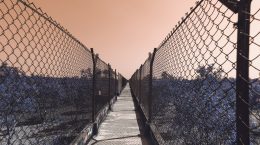In 2020, Lukashenko took part in the sixth presidential election in Belarus. The CEC declared him the winner. The most dangerous competitors of the usurper were in prison – on July 6, 2021, Viktor Babariko got a sentence of 14 years in prison, and the trial of Sergei Tikhanovsky is still ahead. Svetlana Tikhanovskaya and Valery Tsepkalo are abroad, but the Prosecutor General’s Office has been demanding their extradition to Belarus from time to time for almost a year. Meanwhile, Lukashenka has been engaged in defeating his competitors for a long time. We recall how the life of other candidates for the presidency of Belarus turned out after the” victory ” of Lukashenka.
Elections-1994
The pre-election campaign of the first elections in the history of sovereign Belarus began on April 15. Nineteen candidates submitted applications for the desire to become president, but only six collected the necessary number of signatures. Besides Lukashenka, the ballots included Vyacheslav Kebich, Chairman of the Council of Ministers since 1990, deputy of the Supreme Council from the Belarusian People’s Front party Zenon Poznyak, Chairman of the Supreme Council Stanislav Shushkevich, Chairman of the Grodno Regional Council of People’s Deputies, the candidate from the Belarusian Agrarian Party Alexander Dubko and candidate from the Belarusian Party of Communists Vyacheslav Novikov.
The elections were held in two rounds. In the second round, Lukashenka won. More than 80 per cent of electors chose for him. Vyacheslav Kebich received 14 per cent of the votes. After the elections, he became a deputy of the House of Representatives of the National Assembly of Belarus, created by the constitutional referendum of 1996. There was a place in power for the rest of Lukashenka’s competitors. Stanislav Shushkevich was in the Supreme Council of the XIII convocation, Alexander Dubko was the chairman of the Grodno Regional Executive Committee until his death, and Vasily Novikov headed the Institute of Philosophy of the National Academy of Sciences of Belarus.
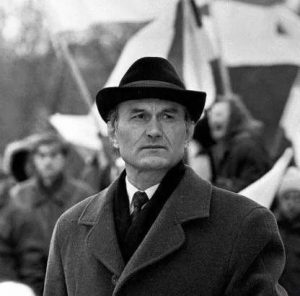 Zenon Poznyak had the hardest time of all. While working in the Supreme Council, he received letters with death threats and curses. In 1995, the deputies of the Supreme Council went on a hunger strike in the parliament building to protest against the referendum of Lukashenka on the introduction of Russian as the second state language, changing the state symbols and integration with Russia. Zenon Poznyak was among them. Together with other protesters, he was beaten and thrown out of the parliament hall. In March 1996, Zenon Poznyak left Belarus but returned a month later to participate in the Charnobylsky Shlyakh march. In June 1997, a criminal case was opened on the politician for statements against Russia. In exile, Zenon Poznyak did not forget about Belarus. He became the chairman of the KHP-BPF party, prepared the program “Free Belarus”, analyzed the events 2020-2021 and gave interviews to foreign media.
Zenon Poznyak had the hardest time of all. While working in the Supreme Council, he received letters with death threats and curses. In 1995, the deputies of the Supreme Council went on a hunger strike in the parliament building to protest against the referendum of Lukashenka on the introduction of Russian as the second state language, changing the state symbols and integration with Russia. Zenon Poznyak was among them. Together with other protesters, he was beaten and thrown out of the parliament hall. In March 1996, Zenon Poznyak left Belarus but returned a month later to participate in the Charnobylsky Shlyakh march. In June 1997, a criminal case was opened on the politician for statements against Russia. In exile, Zenon Poznyak did not forget about Belarus. He became the chairman of the KHP-BPF party, prepared the program “Free Belarus”, analyzed the events 2020-2021 and gave interviews to foreign media.
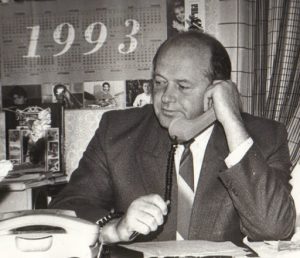 Another candidate, Gennady Karpenko, chairman of the Molodechno city Executive Committee, submitted 108 thousand signatures to the CEC. However, some of them were declared invalid, and as a result, he did not get on the ballot. In 1999, Gennady Karpenko died of a brain haemorrhage. The circumstances of his death are still unknown, and relatives do not believe in the official version – Karpenko was going to run for the post of president of Belarus.
Another candidate, Gennady Karpenko, chairman of the Molodechno city Executive Committee, submitted 108 thousand signatures to the CEC. However, some of them were declared invalid, and as a result, he did not get on the ballot. In 1999, Gennady Karpenko died of a brain haemorrhage. The circumstances of his death are still unknown, and relatives do not believe in the official version – Karpenko was going to run for the post of president of Belarus.
Elections-2001
The next presidential election was supposed to be held in 1999, but two referendums took place in Belarus in 1995 and 1996. The 1996 referendum expanded the powers of the president, Belarus became a presidential republic. As a result, the presidential term was counted from the moment these changes came into force.
The election campaign began on June 20. More than 20 initiative groups of candidates were registered. Among them were Zenon Poznyak, deputy of the Supreme Council Sergey Antonchik, former Prime Minister of Belarus Mikhail Chigir, entrepreneur Valery Levonevsky. However, only three names were on the ballot together with Lukashenka: former deputies of the Supreme Council Semyon Domash and Vladimir Goncharik and the head of the Liberal Democratic Party of Belarus, Sergey Gaidukevich. Semyon Domash withdrew his candidacy a few days before the election. Meanwhile, many unregistered candidates said that they had collected the necessary 100 thousand signatures.
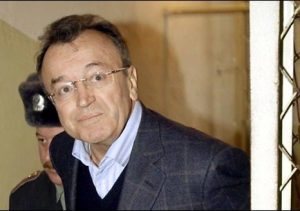 After the elections, the hunt for presidential candidates began. Former Minister of Foreign Economic Activity Mikhail Marinich, who submitted 96 thousand signatures to the CEC, was arrested by the KGB in 2004. A search was at his country house, and a pistol, a large sum of dollars and computer equipment belonging to the US Embassy were seized. Later, it was stated on television that these were funds for supporting the opposition, which Marinich received from Russia to destabilize the situation in Belarus. Mikhail Marinich was sentenced to 5 years in prison, but later, taking into account his previous merits, the term reduced to 3.5 years. Mikhail Marinich was recognized as a political prisoner.
After the elections, the hunt for presidential candidates began. Former Minister of Foreign Economic Activity Mikhail Marinich, who submitted 96 thousand signatures to the CEC, was arrested by the KGB in 2004. A search was at his country house, and a pistol, a large sum of dollars and computer equipment belonging to the US Embassy were seized. Later, it was stated on television that these were funds for supporting the opposition, which Marinich received from Russia to destabilize the situation in Belarus. Mikhail Marinich was sentenced to 5 years in prison, but later, taking into account his previous merits, the term reduced to 3.5 years. Mikhail Marinich was recognized as a political prisoner.
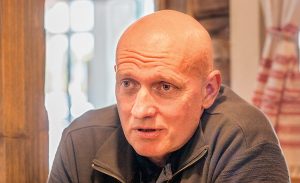 In the summer of 2004, members of the opposition parliamentary group “Republic” began a hunger strike in the Oval Hall of the Parliament against the parliament’s refusal to democratize the electoral code. Among them was the candidate for the 2001 presidential election, Sergei Skrebets. In May 2005, he was detained, a criminal case was opened against him under articles 13, part 1 (preparation for a crime) and 431, part 2 (preparation for giving a bribe). Sergei Skrebets was sentenced to 2.5 years in prison.
In the summer of 2004, members of the opposition parliamentary group “Republic” began a hunger strike in the Oval Hall of the Parliament against the parliament’s refusal to democratize the electoral code. Among them was the candidate for the 2001 presidential election, Sergei Skrebets. In May 2005, he was detained, a criminal case was opened against him under articles 13, part 1 (preparation for a crime) and 431, part 2 (preparation for giving a bribe). Sergei Skrebets was sentenced to 2.5 years in prison.
Elections-2006
The elections were scheduled for March 19, 2006. On December 27, 2005, the registration of presidential candidates began. Initially, seven people submitted applications. In addition to Lukashenka, the former chairman of the Council of the Republic of the National Assembly of Belarus Alexander Voitovich, the leader of the Liberal Democratic Party Sergei Gaidukevich, the former deputy chairman of the Grodno City Executive Committee Alexander Milinkevich, the former rector of BSU Alexander Kozulin, the deputy of the House of Representatives of the National Assembly of the Republic of Belarus of the second convocation Valery Frolov, as well as Zenon Poznyak and Sergei Skrebets (he applied from prison) decided to run. Later, Poznyak, Skrebets, Frolov, Voitovich announced their withdrawal from the presidential race.
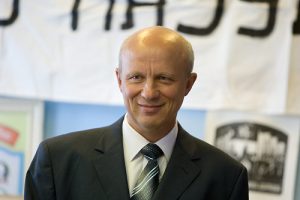 The candidate whom Lukashenka made a scapegoat was Alexander Kozulin – he was remembered for scandalous statements about the dictator’s personal life, pretentious demands to return money to the people and tearing up the newspaper “Soviet Belarus”. On March 2, 2006, he tried to break through to the All-Belarusian People’s Assembly in the Railway Workers’ Recreation Center. In the elections, Alexander Kozulin won 2.23 per cent of the votes, according to official data. Independent opinion polls showed that this number was several times higher. On March 25, 2006, Alexander Kozulin was arrested. On July 13 of the same year, he was sentenced to 5.5 years in prison “for malicious hooliganism and organizing mass riots.”
The candidate whom Lukashenka made a scapegoat was Alexander Kozulin – he was remembered for scandalous statements about the dictator’s personal life, pretentious demands to return money to the people and tearing up the newspaper “Soviet Belarus”. On March 2, 2006, he tried to break through to the All-Belarusian People’s Assembly in the Railway Workers’ Recreation Center. In the elections, Alexander Kozulin won 2.23 per cent of the votes, according to official data. Independent opinion polls showed that this number was several times higher. On March 25, 2006, Alexander Kozulin was arrested. On July 13 of the same year, he was sentenced to 5.5 years in prison “for malicious hooliganism and organizing mass riots.”
US President George Bush, the authorities of the EU countries demanded to release of Alexander Kozulin. He refused to plead guilty and did not sign a paper stating that he was committed to “embark on the path of correction”. In exchange for the refusal of political activity, Kozulin and his family got an offer to be taken to Germany. And in February 2008, he was not allowed to attend the funeral of his wife, who died of cancer. As a result, Kozulin went on a hunger strike. In August 2008, Lukashenko issued a decree pardoning his former opponent.
Elections-2010
The election campaign began on September 14. On November 18, the Central Election Commission registered ten presidential candidates. Besides Lukashenka, among the names were Grigory Kostusev, an oppositionist from the BPF party, Alexey Mikhalevich, a lawyer, Vladimir Nyaklyaev, a representative of the Tell the Truth public organization, Yaroslav Romanchuk, an economist, Vitaly Rymashevsky, a representative of the BCD party, Andrei Sannikov, a representative of the European Belarus campaign, Nikolai Statkevich, a leader of the Narodnaya Gramada party, Viktor Tereshchenko, an economist, and Dmitry Uss, an entrepreneur.
Even before the vote, some candidates faced the refusal of printing houses to accept leaflets for printing. People from the initiative groups of Vladimir Nyaklyaev, Andrei Sannikov, Vitaly Rymashevsky, Yaroslav Romanchuk were persecuted and even beaten. The CEC issued warnings to groups of opposition candidates. The elections were held under the supervision of the OSCE, and more than 1000 journalists were accredited, two-thirds of whom are foreigners.
On December 19, 2010, after the victory of Alexander Lukashenko, a protest action was in Minsk with the participation of opposition candidates. More than 60 thousand people gathered on Oktyabrskaya Square in Minsk and marched to the Government House, where they tried to take it by storm. Internal troops and special forces beat people, a criminal case was opened under Article 293 of the Criminal Code (organization of mass riots). Seven presidential candidates passed through it. Lukashenka called the incident in Minsk an attempt at a putsch.
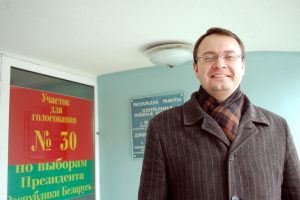 Alexey Mikhalevich was detained a few hours after the closing of the polling stations. On January 11, 2011, he was recognized as a prisoner of conscience. His lawyers were deprived of their law licenses and expelled from the Minsk City Bar Association. Two months later, Alexey Mikhalevich was released – he expressed that this happened on the condition of his cooperation with the special services of Belarus. Alexey Mikhalevich said that he suffered torture in prison. In March 2011, he applied for political asylum in the Czech Republic.
Alexey Mikhalevich was detained a few hours after the closing of the polling stations. On January 11, 2011, he was recognized as a prisoner of conscience. His lawyers were deprived of their law licenses and expelled from the Minsk City Bar Association. Two months later, Alexey Mikhalevich was released – he expressed that this happened on the condition of his cooperation with the special services of Belarus. Alexey Mikhalevich said that he suffered torture in prison. In March 2011, he applied for political asylum in the Czech Republic.
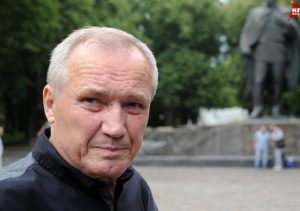 Vladimir Nyaklyaev was on Oktyabrskaya Square on December 19, and police officers beat him. He was taken to the hospital in a serious condition, from where he reached a pre-trial detention centre. Later, the Ministry of Internal Affairs said that the security forces had detained two cars with explosives belonging to the headquarters of Nyaklyaev. Such a version was denied by all the associates of the presidential candidate. A lawyer was not allowed to see Lukashenka’s opponent, and then he was charged under Article 293 of the Criminal Code. On January 29, 2011, Vladimir Nyaklyaev was released under house arrest. About a hundred cultural figures from different countries, including the Nobel Prize winner Vislava Shimborskaya, the poet Yevgeny Yevtushenko, the actor Konstantin Khabensky and many others, asked for his release. Vladimir Nyaklyaev was sentenced to 2 years in prison with a 2-year suspended sentence.
Vladimir Nyaklyaev was on Oktyabrskaya Square on December 19, and police officers beat him. He was taken to the hospital in a serious condition, from where he reached a pre-trial detention centre. Later, the Ministry of Internal Affairs said that the security forces had detained two cars with explosives belonging to the headquarters of Nyaklyaev. Such a version was denied by all the associates of the presidential candidate. A lawyer was not allowed to see Lukashenka’s opponent, and then he was charged under Article 293 of the Criminal Code. On January 29, 2011, Vladimir Nyaklyaev was released under house arrest. About a hundred cultural figures from different countries, including the Nobel Prize winner Vislava Shimborskaya, the poet Yevgeny Yevtushenko, the actor Konstantin Khabensky and many others, asked for his release. Vladimir Nyaklyaev was sentenced to 2 years in prison with a 2-year suspended sentence.
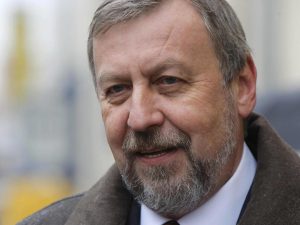 On the night of December 19-20, 2010, Andrei Sannikov and his wife were detained. He was taken to the KGB pre-trial detention centre. Andrei Sannikov was recognized as a political prisoner, and he was sentenced to five years in a penal colony. At the end of 2011, he wrote a petition for clemency addressed to Lukashenka. On April 14, a decree on his pardon was issued, and Andrei Sannikov was released. In October 2012, he received political asylum in the UK.
On the night of December 19-20, 2010, Andrei Sannikov and his wife were detained. He was taken to the KGB pre-trial detention centre. Andrei Sannikov was recognized as a political prisoner, and he was sentenced to five years in a penal colony. At the end of 2011, he wrote a petition for clemency addressed to Lukashenka. On April 14, a decree on his pardon was issued, and Andrei Sannikov was released. In October 2012, he received political asylum in the UK.
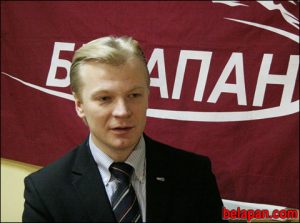 Vitaly Rymashevsky was detained on December 19, 2010. He spoke to people on Independence Square, and even before the clash with the riot police, tried to prevent it, received several blows to the head, but even with his head bandaged, he remained close to the voters. On December 31, 2010, he was released from the KGB pre-trial detention centre, and on May 20, 2011, he was sentenced to 2 years of probation.
Vitaly Rymashevsky was detained on December 19, 2010. He spoke to people on Independence Square, and even before the clash with the riot police, tried to prevent it, received several blows to the head, but even with his head bandaged, he remained close to the voters. On December 31, 2010, he was released from the KGB pre-trial detention centre, and on May 20, 2011, he was sentenced to 2 years of probation.
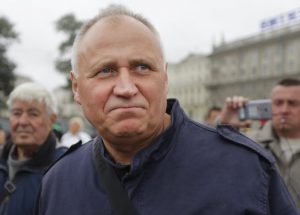 Mikalai Statkevich was detained in Minsk after the action on December 19, 2010. On the eve of the elections, he said that he was ready to take responsibility for the Square. He was also placed in the KGB pre-trial detention centre. In May 2011, Mikalai Statkevich was sentenced to 6 years in prison. He served his sentence in the Shklov colony, where he was given the status of a malicious violator. The conditions of his detention became strengthened. In 2015, by the decision of Lukashenka, he was released from prison ahead of schedule.
Mikalai Statkevich was detained in Minsk after the action on December 19, 2010. On the eve of the elections, he said that he was ready to take responsibility for the Square. He was also placed in the KGB pre-trial detention centre. In May 2011, Mikalai Statkevich was sentenced to 6 years in prison. He served his sentence in the Shklov colony, where he was given the status of a malicious violator. The conditions of his detention became strengthened. In 2015, by the decision of Lukashenka, he was released from prison ahead of schedule.
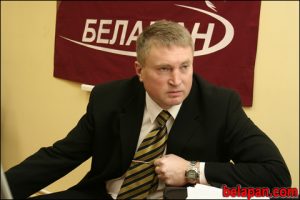 Businessman Dmitry Uss was detained on the night after the 2010 elections. Uss was held in a KGB pre-trial detention centre but was soon released on his recognizance. The security forces demanded him to stipulate political opponents of Lukashenka in exchange for freedom. On May 26, 2011, he was sentenced to 5.5 years of imprisonment in a high-security colony. Uss was released on October 1, 2011, after being pardoned.
Businessman Dmitry Uss was detained on the night after the 2010 elections. Uss was held in a KGB pre-trial detention centre but was soon released on his recognizance. The security forces demanded him to stipulate political opponents of Lukashenka in exchange for freedom. On May 26, 2011, he was sentenced to 5.5 years of imprisonment in a high-security colony. Uss was released on October 1, 2011, after being pardoned.
Elections-2015
Nine candidates applied for the elections held on October 11, 2015. But only three appeared on the ballot besides Lukashenko: the leader of the Liberal Democratic Party, Sergei Gaidukevich, a representative of the public organization “Tell the Truth”, Tatyana Korotkevich, and a representative of the Belarusian Patriotic Party, Nikolai Ulakhovich. During the election campaign, the other candidates recorded several violations committed by Lukashenka. Presidential candidate Tatyana Korotkevich appealed to the CEC in this regard. Several opposition representatives called for a boycott of the elections. According to the CEC, Lukashenka won 83.47 per cent of the votes. There were no repressions against the candidates.
By destroying competitors, the illegitimate president shows how weak he is and how much he is afraid of anyone who claims to be in his place. We see that both twenty years ago and now, presidential candidates were detained, accused of attempting a coup, financing protests, organizing mass riots. Most of all, Lukashenka is afraid of the possibility of losing his throne. Power for him is his whole life. A person who is aimed at preserving control will not be able to think about the people, build the economy, social sphere, preserve culture. Anyone who is against him seems to be an enemy to him – and we see that this is already the entire Belarusian people. Belarus is in the power of a usurper, and we must do everything to liberate our country.






